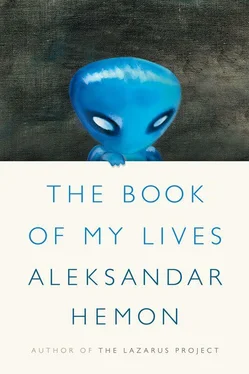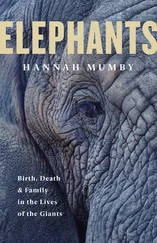At the same time, there is the inescapable reality of the self transformed by immigration — whoever we used to be, we are now split between us-here (say, in Canada) and us-there (say, in Bosnia). Because we-here still see the present us as consistent with the previous us , still living in Bosnia, we cannot help but see ourselves from the point of view of us-there . As far as their friends in Sarajevo are concerned, my parents, despite their strenuous efforts at differentiation, are at least partly Canadian, which they cannot help but be aware of. They have become Canadian and they can see that because they remained Bosnian all along.
The inescapable pressure of integration goes hand in hand with a vision of a life my parents could live if they were what they see as being Canadian. Every day, they see the Canadians living what in the parlance of displacement is called “normal life,” which is fundamentally unavailable to them despite all the integrationist promises. They are much closer to it than any of us back home, so they can envision themselves living a normal Canadian life — my parents can experience themselves vicariously as the others, not least because they have spent so much time and mind on comparison with them. Still, they can never be them .
The best theoretical expostulation on the subject above is a Bosnian joke, which loses some of its punch in translation but retains an exceptional (and typical) clarity of thought:
Mujo left Bosnia and immigrated to the United States, to Chicago. He wrote regularly to Suljo, trying to convince him to visit him in America, but Suljo kept declining, reluctant to leave his friends and his kafana (a kafana is a coffee shop, bar, restaurant, or any other place where you can spend a lot of time doing nothing while consuming coffee or alcohol). After years of pressuring, Mujo finally convinces him to come. Suljo crosses the ocean and Mujo waits for him at the airport in a huge Cadillac.
“Whose car is this?” asks Suljo.
“It’s mine, of course,” Mujo says.
“That is a great car,” Suljo says. “You’ve done well for yourself.”
They get in the car and drive downtown and Mujo says: “See that building over there, a hundred floors high?”
“I see it,” Suljo says.
“Well, that’s my building.”
“Nice,” Suljo says.
“And see that bank on the ground floor?”
“I see it.”
“That’s my bank. When I need money I go there and just take as much as I want. And see the Rolls-Royce parked in front of it?”
“I see it.”
“That’s my Rolls-Royce. I have many banks and a Rolls-Royce parked in front of each of them.”
“Congratulations,” Suljo says. “That’s very nice.”
They drive out of the city to the suburbs, where houses have grand lawns and the streets are lined with old trees. Mujo points at a house, as big and white as a hospital.
“See that house? That’s my house,” Mujo says. “And see the pool, Olympic size, by the house? That’s my pool. I swim there every morning.”
There is a gorgeous, curvaceous woman sunbathing by the pool, and there are a boy and a girl happily swimming in it.
“See that woman? That’s my wife. And those beautiful children are my children.”
“Very nice,” Suljo says. “But who is that brawny, suntanned young man massaging your wife and kissing her neck?”
“Well,” Mujo says, “that’s me.”
5. WHO ARE THEY?
There is also a neoconservative approach to otherness: the others are fine and tolerable as long as they are not trying to join us illegally. If they are here already and legal at that, they will also need to adapt to our ways of life, the successful standards of which have long been established. The distance of the others from us is measured by their relation to our values, which are self-evident to us (but not to them). The others always remind us of who we truly are — we are not them and never will be, because we are naturally and culturally inclined toward the free market and democracy. Some of them want to be us — who wouldn’t? — and might even become us, if they are wise enough to listen to what we tell them. And many of them hate us, just for the hell of it.
George W. Bush, in a speech to the faculty and students of an Iowa college in January 2000, succinctly summed up the neoconservative philosophy of otherness in his own inimitably idiotic, yet remarkably precise, way: “When I was coming up, it was a dangerous world and you knew exactly who they were. It was us versus them and it was clear who them was. Today, we are not so sure who the they are, but we know they’re there.”
And then the they flew in on September 11, 2001, and now they are everywhere, including the White House, by way of a falsified birth certificate. Every once in a while we round them up, take them to Guantánamo Bay on secret flights or arrest them in raids and deport them or demand from them to declare unequivocally that they are not them . And whoever they may be, we need to win the war against them so that we can triumphantly be alone in the world.
6. WHAT ARE YOU?
Here is a story I like to tell. I read it in a Canadian newspaper, but I have told it so many times that it occasionally feels as though I made it up.
A Canadian professor of political science went to Bosnia during the war. He was born somewhere in the former Yugoslavia, but his parents emigrated to Canada when he was a child, which is to say that he had a recognizably South Slavic name. In Bosnia, equipped with a Canadian passport and a UNPROFOR pass, he went around with armed, blue-helmeted escorts, fully protected from the war so he could study it. With his Canadian passport and a UNPROFOR pass, he passed through many checkpoints. But then he was stopped at one, and the curiosity of the soldiers was tickled by the incongruity of a South Slavic name in a Canadian passport, so they asked him: “What are you?” His adrenaline was no doubt high, he must’ve been pretty terrified and confused, so he said: “I am a professor.” To the patriotic warriors at the checkpoint, his answer must’ve bespoken a childlike innocence, for they most certainly hadn’t asked him about his profession. They must have laughed, or told stories about him after they let him go. He must have seemed unreal to them.
To be at all comprehensible as a unit of humanity to the ethnically brave men at the checkpoint he had to have a defined — indeed a self-evident — ethnic identification; the professor’s ethnicity was the only relevant piece of information about him. What he knew or didn’t know in the field of political science and pedagogy was hysterically irrelevant in that part of the world carved up by various, simultaneous systems of ethnic otherness — which, as a matter of fact, makes it not all that different from any other part of the world. The professor had to define himself in relation to some “other” but he couldn’t think of any otherness at that moment.
To be a professor again he had to return to Canada, where he may have run into my parents, for whom he would have been a perfect specimen of one of them.
7. WHAT AM I?
My sister returned to Sarajevo after the war and worked there equipped with a Canadian passport. Because of the nature of her work as a political analyst, she encountered a lot of foreign and domestic politicians and officials. Brandishing a somewhat ethnically confusing name, speaking both Bosnian and English, she was hard to identify and was often asked, by both the locals and foreigners: “What are you?” Kristina is tough and cheeky (having survived an assassination attempt early in her life) so she would immediately ask back: “And why do you ask?” They asked, of course, because they needed to know what her ethnicity was so they could know what she was thinking, so they could determine which ethnic group she was truly representing, what her real agenda was. To them, she was irrelevant as a person, even more so as a woman, while her education or ability to think for herself could never overcome or transcend her ethnically defined modes of thought. She was hopelessly entangled in her roots, as it were.
Читать дальше












